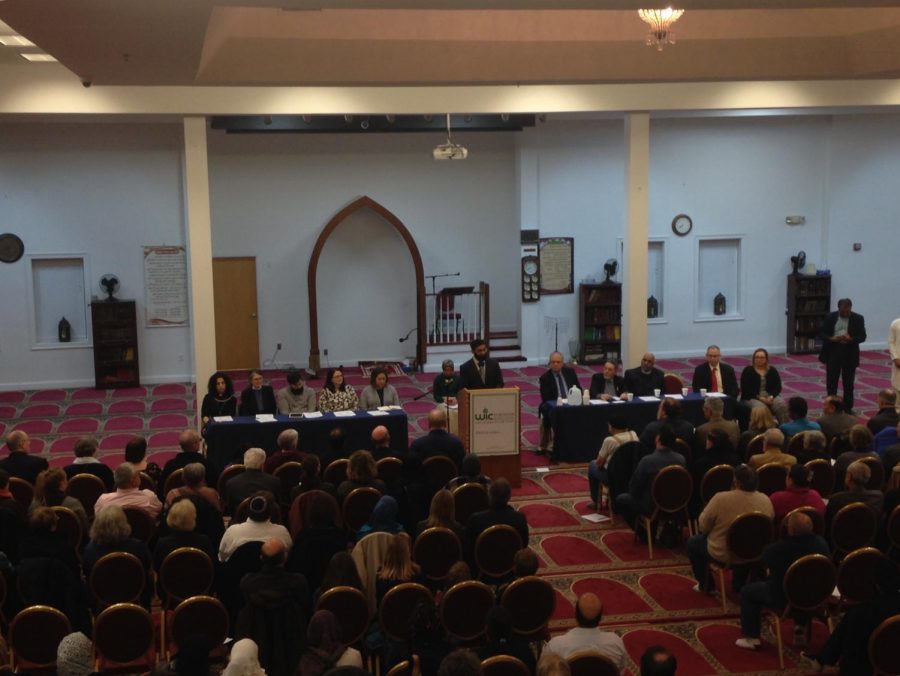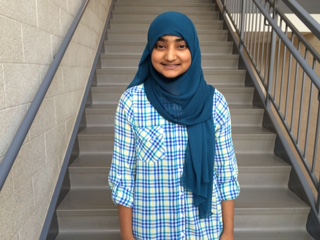Despite desensitization we should feel something
Senior Asma Ali gives immediate thoughts on New Zealand attacks
On March 15, 2019, 49 worshippers were shot at a mosque in Christchurch, New Zealand. The following night senior Asma Ali attended a memorial event at her local mosque, Worcester Islamic Center, where around 2,000 people of various faiths gathered to mourn the loss of the victims.
March 30, 2019
Forty-nine people dead (and still counting). I type my thoughts blearily on the Notes app of my phone, perhaps so that I can sift through my emotions and separate them out into neat piles.
I’m tired of this
On March 15, 2019, a white terrorist shot dead 50 innocent worshippers and wounded over 20 others at two mosques in Christchurch, New Zealand.
Does that line sound familiar?
Yeah, because you hear it approximately every month.
It runs like a twisted game of Mad Libs: ___ (pick a number) people were shot dead at ___ (pick an institution) in the country of ___ (make sure it’s a first-world country, or else we can’t run it in the news because nobody will be able to empathize).
We have become so desensitized to these news stories that hearing them doesn’t shock us anymore.
And I’m tired of going through this every time: scrolling through news articles, looking at disturbing footage that I never asked to see, seeing social media thoughts and prayers and reading through the names of victims, then passively watching the way everything blows over in a couple of days like nothing ever happened.
Then we all sit in class and imagine what we’d do first if a shooter were to burst open our classroom door at that moment.
Wait, why is nobody talking about this one?
On Friday morning, a moment of silence was done over morning announcements at Algonquin. I later learned through many of my friends that a large percentage of their first period classes did not know what had happened, nor did they show any visible emotion when they found out.
Understandable. See above: desensitization.
That afternoon, I tapped my way through hundreds of Instagram stories. For a minute, I felt better knowing that so many people had posted awareness for the tragedy that had occurred. Then I realized that all of the posters had one thing in common: they were all minorities.
Mostly, they were all other Muslims, just like me. Where were the #WeAreChristchurch hashtags? Where were the Facebook filters? Where was the solidarity that I thought would be prevalent that afternoon? Maybe it just wasn’t cool to post support of terrorism victims if it was the white person doing the terrorizing.
But human lives are human lives, not pawns to play for any statement, whether it be political or otherwise. It doesn’t matter the group, the place, or the country.
Okay, now I’m angry
The catalyst for me was a news article from the Mail, a British news site, called, “‘Something happened during his travels’: How a blonde little boy turned into a far-right mass killer and murdered 49 worshippers after his father died of cancer and he left Australia to tour the world, including North Korea and Pakistan.”
There’s a lot to unpack here.
Am I allowed to ask why he’s specified to be blonde? Why is his cute little baby picture under that title? Why are we blaming his horrific actions on his father’s cancer and his travels? Are we supposed to sympathize with the terrorist?
You know that if it were a black or brown person as the perpetrator, it would have been worded much differently. And I hate that. I hate that so much.
Yes, I agree that all lives are worth the same, and having a non-white gunman doesn’t make this any better. But it’s this blatant Islamophobia that is the problem; Muslims will always be painted as the evil, even when 49 innocent ones are lying dead.
This, in part, is what keeps the fire fueled; it is why our global cycle of hatred keeps circling around and around like a broken record.
Take it from Australian senator Fraser Anning, who said in a statement that “…whilst this kind of violent vigilantism can never be justified, what it highlights is the growing fear within our community, both in Australia and New Zealand of the increasing Muslim presence.” He went on to say that “the real cause of bloodshed on New Zealand streets today is the immigration program which allowed Muslim fanatics to migrate to New Zealand in the first place.” I’ll leave that up to you to think about.
Everything about this really hurts
The perpetrator had livestreamed the entire act on Facebook. People watched it happen. I came across the video that afternoon before all the social media warnings popped up urging all of us not to watch it.
I’ve got to say that it was honestly one of the worst, if not the worst video I’ve ever watched. I sat on my bathroom floor for the next ten minutes, trying not to throw up. I’ve seen people get shot in video games and movies. This wasn’t a video game or a movie. This was the real deal; these were forty-nine innocent human lives, gathered together inside what was supposed to be a place of peace.
The worst part of it all was that I could imagine myself there. I, too, have sat in a mosque before for Friday prayers. I understand the shock of the first man to get shot, who called out to the terrorist with a greeting of “Peace, brother.” I feel the transition of emotions from the tranquility of the mosque to the raw panic and confusion that each and every one of those worshippers must have felt.
This isn’t just a Muslim thing. This is a human lives thing. We are all one for Christchurch, just like we were all one for the Pittsburgh synagogue shooting last fall and the Charleston church shooting a couple years ago and every other such human lives tragedy that has ever occurred. It should not take tragedies for us to support one another.
We’ll be okay, but also not really
I went to a remembrance event the night after the shooting at my local mosque, Worcester Islamic Center. A panel made up of local clergy such as rabbis and reverends were there, as well as law enforcement officers including a police officer and a special agent of the FBI.
The center was packed that night; around two thousand people of various beliefs were present.
I will always remember when Reverend and District 4 City Councilor Sarai Rivera came up to the podium and stated that she was exhausted at the idea that she was standing “yet one more time” to remember lives lost in these attacks, and the whole room felt that. We’re all mentally exhausted by it.
Yet I felt a warm sense of support that night, watching a large room of people stand in solidarity under the same great big roof. Yes, we have each other. No, the lives we keep losing will never return, and I cannot even begin to comprehend the emotions of the victims’ loved ones. But they want to divide us. And no matter what keeps getting thrown at us, we’ll never let that happen.










